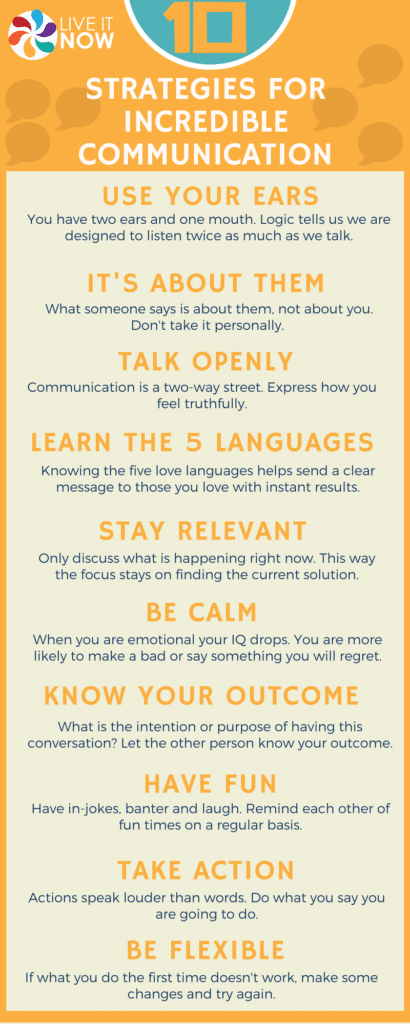

10 Strategies For Better Communication
Life is about relationships! And for better relationships, we need better communication.
You may feel right now that none of your relationships are working and it’s everyone’s fault. The good news is turning your relationships around is easy. All you need to do is learn how to communicate on another person’s level.
No matter what the state of your current relationship, or who that relationship is with, your parents, your siblings, your kids or your life partner, you can take it up a level by increasing your communication skills.
When you are communicating well, it’s noticeable. Arguments and miscommunication are draining, confusing and can really affect your self confidence. Let’s turn that around and shift your relationships to a level you are excited about.
Communication is a lot more than just talking to each other. Good communication is active listening, taking the time to see where the other person is coming from and not taking a conversation personally.
I’ve created ten steps for simple communication, delivered in bite size pieces that will show you really simple ways to get your relationship to level ten today. Do one or do all ten, anything you use is a start in the right direction.
- Use your ears.
We have two eyes, two ears and only one mouth. That’s a really good indication that seeing what’s in front of us and hearing what someone has to say is twice as important as the words coming out of our mouth. Not only can you not hear others when you talk, it’s also difficult for other people to hear you. Stop and listen to what is actually being said. Give that person your full attention and realize they are communicating something to you. Keep an ear out for emotional phrases: I feel. I think. I am. This is the heart of the issue. This is where your attention can go for a great response. How are they feeling, what are they thinking?
- It’s about them.
It might seem like it’s personal, especially if someone is calling you names, but it’s not about you, it’s always about them. A child throwing a tantrum, your partner getting grumpy with you, your mother giving a withering look. It’s about how they feel, not what you have done or not done. Rising to a knee -jerk reaction will only spread the fire, or maybe start one that was only smoldering.
Getting defensive, being guarded, getting heated or laying blame will not move the conversation forward.
Hear what their problem is so you can tackle it together. Take yourself out of the equation and focus your full attention on what’s really going on.
If you find you get confused about what people say to you, get into the habit of rephrasing what they tell you. It switches on your active listening and also gives them a clue that you are listening, or that you are off base, which can be corrected by them clarifying what they said, so everyone understands the point more clearly.
“So I heard you say …is that right?”
- Talk openly.
Communication goes both ways. You listen to someone, then they listen to you. Make your talking time count by saying what’s really relevant. Use those emotive words: I think. I feel. I am. To describe what is happening in a way someone can easily hear and understand.
Make it about you so there is no confusion about who is to blame. (Be sure to take turns so you both – or all – get a say about how you are feeling or thinking).
There are no right or wrong ways to think or feel. Everyone is entitled to their own opinion and every person is responsible for how they feel.
If you are unfamiliar with your emotions or talking about feelings get into practice by reading over emotional charts and identifying moods as soon as you feel them.
Practice saying your emotions, thoughts and feelings out loud. They are never wrong. Trust your gut and trust the person listening to be okay with how you feel.
Some people practice squashing their emotions down their whole lives down. Those emotions will come back and bite you somehow down the line, it’s impossible to suppress them forever. Pretending you are okay doesn’t work, your loved ones will know instinctively that things are not okay, and they will not know why, not unless you tell them.
It’s never as big or as ugly as you think in your head. Get the truth out as early as possible. You’ll sleep better, feel better and function better when you are honest with yourself and everyone around you.
- Learn love languages.
Take the love language quiz online and ask your partner to do the quiz too. There is also a section for kids. The most eye-opening thing can be realizing that the way someone operates around you is just their own personal way of loving you, you just didn’t understand it before.
Knowing your own love language as well as your family’s can enable them and you to say, “I love you” or even, “I care about you,” or, “I respect you” in a way that is better received and appreciated.
We expect that everyone says and acts the same way we do. Actually, we are all different people with different values, different life lessons and different ways of operating. Leaning other love languages is a surprisingly simple and powerful way to get on the same page.
You can go one step further and learn how to say sorry in your partner’s language as well. It really speeds up the apologizing process and leaves everyone feeling calm and resolved.
- Stay relevant.
Stay on track. Only discuss what is happening right now. Dragging up things that have happened in the past or predicting how things will be in the future distract from resolving and assisting in the moment.
There is a bigger reason to keep the past out of an argument. It has to do with distorting reality. When we go into the past looking for something negative, we recall and return to other negative points as well. Calling up negatives from the past cuts off the chance of finding new positives or seeing things differently. It narrows choices and limits decision making to only include decisions we made back then.
When we fall back into past negatives we can end up circling back into old and unhelpful patterns and wind up making the same bad choices over and over because we are not open to something new.
Limit what you are discussing to right now and stay present. Actively go looking for creative ways to make improvements by asking yourself and your loved ones positive questions that generate choices and joy.
- Keep your IQ high.
When emotions go up, intelligence goes down. Your IQ actually drops when you are emotional.
That means that if someone in the conversation is highly emotional, chances are they are not going to make smart choices. Take the time to let them feel that emotion, be there for them, if they are excited, get excited, if they are sad, give them space to be sad, if they are angry, let them be angry for a moment. It will pass.
If someone is fearful about making a decision, take the time to discuss their fears and find reassurances that will help calm them before going back to the choices.
If you are the one experiencing a high emotion, ask for space or time in that emotion before talking about it. You can even put a timeframe on it. “Can I have five minutes first, then we can discuss it?”
When things are calm you can talk about big issues and look at situations that require big decisions, knowing the options, solutions and choices you make will be smart ones.
- Know your outcome.
When you are having a conversation with someone, know the result you want. How do you want to feel at the end of the discussion?
If you are only talking because you want to be right, or you want to win the argument, that’s just your ego talking. The purpose of your ego is survival. The fuel of your ego is blame and fear. The only outcome is limited options and negative feelings.
Is this the conversation you want to have with anyone?
Are you ever really going to win?
It is not about one person being right and one person being wrong. It’s two people opening up to see the other’s point of view.
Decide how you want the conversation to feel when it is over. If it’s a positive feeling, then you need to have a positive conversation where everyone involves gets a say and feels heard.
- Have fun.
We can easily fall into negative cycles when we discuss emotional topics. That might be because we didn’t get taught how to communicate our emotions as children, meaning we quickly fall into negative emotions and old pathways when confronted with something emotional. We may also be instantly reminded of memories where we felt helpless or vulnerable or angry in the past.
You can intentionally break this pattern by throwing in something fun or playful. You and your loved ones will already have your own unique sense of humor and banter. When you use these in conversation you remind your partner who they are talking to. “This is me, this is us.” It interrupts old memories and patterns and gets them back in the moment. It doesn’t have to be a joke, it can just be something private between the two of you.
To make this even more powerful have fun and be playful together as part of your every day communication. Keep your fun positive, rather than making fun of other people or sarcasm, work positive humor into your discussions to create a positive bond, lighten the mood, help to de-stress and gain some perspective on the day. When fun is a part of your everyday lives, using it occasionally when arguing is even more effective to breaking an old negative cycle.
Remember to stay on topic though. Just because your partner or child is laughing, it doesn’t necessarily mean the problem disappears, so follow up with some serious listening and be open to what they have to say now they are back in the room with you.
- Actions speak louder than words.
Everything we do is an act of communication, whether we think about it or not. Your actions are speaking for you all the time so make a conscious effort for some of your daily actions to reflect what you actually want to say.
Thinking about your loved ones? Send them a text or email or photo that simply says, thinking of you.
Follow up on those love language lessons and carry out actions that your loved one will appreciate, do them a favour, buy them a small gift, sit and spend time talking about their favourite thing, hide notes for them to find or give them a massage.
- Be flexible.
If your loved one doesn’t respond when you question them directly, find another way.
Some people feel anxious or interrogated when they are asked questions, especially questions that start with I and You.
Try asking questions that are more casual and conversational. Change I and You to We or Us.
If you have a partner who isn’t great at talking, spend some time with them, especially in their love language to get them feeling at ease. You’ll be surprised how much someone will open up without you even asking any questions if at the end of a tiring day you give them a nice back rub. When you create a space and just be there with them, they will naturally want to fill it.
Knowing these easy steps and actively being part of your loved ones life is everything you need to do. You don’t need to be able to fix the problem or have all the answers.
Communication doesn’t require any solutions, just being there and understanding what they are saying and experiencing is what makes a relationship work really well. When you get your communication strategies right you get to share the experience with them. In times of stress or hardship, good communication calms the situation down, opens up more creative thinking, provides more options and different perspectives. From there you have the ability to make better decisions and get better results.
It’s never too late to improve your communication skills. Even in the middle of the most heated argument, there is still time to reset, go back to listening and start again.
Kindest regards,
Matt Catling







